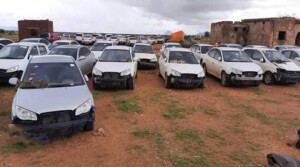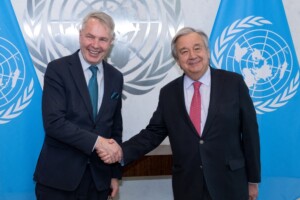People ‘desperate and afraid’ as Sudan economy becomes increasingly fragile
Economic analyst Khalid Saad said that low inflation does not necessarily indicate that the economic situation is good, explaining economic indicators will only recover once there is political stability in the country. A resident in Omdurman told Radio Dabanga: “We all are desperate and afraid of the future. I tell you, Sudan is gone.”
 Trader at Omdurman Market (File photo: Adam Abaker)
Trader at Omdurman Market (File photo: Adam Abaker)
Economic analyst Khalid Saad said that low inflation does not necessarily indicate that the economic situation is good, explaining economic indicators will only recover once there is political stability in the country. A resident in Omdurman told Radio Dabanga: “We all are desperate and afraid of the future. I tell you, Sudan is gone.”
Economic indicators “should be read in the context of other economic statistics, along with the fact that the state no longer controls Sudan’s economic system,” he told Radio Dabanga on Monday.
“Political liquidity” in the country has led to “chaos” in inflation figures and the failure to develop a solid economic policy, he said, warning that “the economy has become extremely fragile.”
On Sunday, the Sudanese Central Bureau of Statistics reported that annual inflation fell from 107 per cent in September to 102.6 per cent in October. “The decreased inflation percentage has nothing to do with improved livelihoods, and is rather a state of stagnation which is the result of weak purchasing power,” the economist explained. He pointed out that more than 60 per cent of Sudan’s commodities are being traded on the black market.
On the same day, income taxes were amended by the Ministry of Finance and Economic Planning amidst complaints and strikes against the government’s tax policies. “Exorbitant” tax increases affecting exports and imports in the last two months have also contributed to stagnation. “The government does not encourage exports and is unable to impose any policies that would contribute to economic solutions,” Saad said.
Many Sudanese people have told Radio Dabanga that market prices are too high. “My salary of SDG50,000 ($87*) only covers two daily meals for five days a week,” a young teacher said. “I’ve now hired a rickshaw to earn some more money in the evenings. Unfortunately, these days fewer people can afford to take a rickshaw, in particular since we had to raise our tariffs since fuel prices increased again a few days ago.”
“There is not even the tiniest mechanism controlling the market prices anymore,” a housewife in a middle-class neighbourhood in Omdurman complained. “Every trader does what they like, keeping sorghum stored until prices soar.” She said her family is currently buying food wholesale with relatives to keep costs down.
“Every shop is now selling food items for different prices, so my neighbours and I regularly compare the amounts, and then see what we can buy with the little money we have for each day.”
She said that she has not visited Omdurman Market for some time, “but when I went last week, I was surprised to see much fewer customers in the shops.
The mother of five also said that her husband sold their car to pay for school fees this year. “He wants our children to receive a good education at private schools instead of having to go to government schools where the exam results show that they do not learn anything. But even if we had to register them at government schools, we would have to pay subscription fees as well as these schools are hardly financed anymore,” she sighed.
“We all are desperate and afraid of the future. I tell you, Sudan is gone,” she said. In an interview on Radio Dabanga’s Sudan Today programme in September, economic expert Sidgi Kaballo described the inflation figures as “disturbing” and warned of a “revolution of the hungry” if the root causes of the economic problems are not addressed.
* The selling rates of the American dollar at Sudanese banks on November 14 varied between SDG583-567 according to the Central Bank of Sudan.











 and then
and then